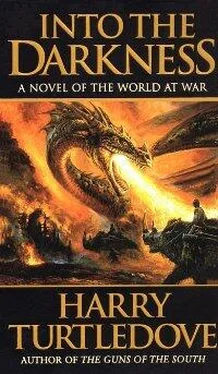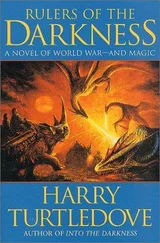The first Kaunians on the list were Falsirone and Evadne. “Those don’t look like Kaunian names,” Oraste said, but then he shrugged. “Doesn’t matter what they call themselves. If they’re Kaunians, they’re gone.”
Falsirone and Evadne stared in dismay when the constables strode into their tonsorial parlor. They stared in horror when Bembo told them why the constables had come. Pointing a finger at him, Evadne shrilled, “You told us we wouldn’t get into trouble, you liar!”
“You’re not in trouble for that,” Bembo said, strangling the guilt that crept out from the dark places at the bottom of his mind. “This is only a precaution, till the war is safely won.” He didn’t know that—no one had said anything of the sort—but it seemed a reasonable guess.
Oraste smacked his club into the palm of his hand. “Get moving,” he said flatly.
“But what about everything here?” Evadne wailed, waving an arm to show off the shop and everything in it.
Bembo glanced at Oraste. Oraste’s face had not the slightest particle of give in it. Bembo decided he had better not show any give, either. “Hazard of war,” he said. “Now come along. We haven’t got all day here.”
Still complaining loudly and bitterly—still acting very much as veritable Algarvians would have done—Evadne and Falsirone came. Bembo and Oraste led them to the park where Bembo had spent his unhappy hours as an emergency militiaman. More constables, and some soldiers as well, took charge of them there. “On to the next,” Oraste said.
The next proved to be a prominent restaurateur. Bembo understood another reason why his superiors had sent constables out in pairs: it made them harder to bribe. With Oraste glaring at him as if looking for the smallest excuse to beat him bloody, the Kaunian didn’t even try, but came along meek as a lamb heading for sacrifice. Bembo let out a silent sigh. He would have been much more reasonable.
When he and Oraste got to the third establishment on their list, they found it empty. Oraste scowled. “Some other bastards beat us to it,” he said.
“I don’t think so,” Bembo answered. “I think word’s out on the street. A lot of blonds will be figuring they ought to disappear.”
“We’ll get ’em,” Oraste said. “Sooner or later, we’ll get ’em.”
By nightfall, the constables had rounded up several hundred Kaunians. Almost an equal number, though, had not been there to round up. Despite that, Captain Sasso said, “Good job, men. The kingdom’s long overdue for a cleanup, and we’re the fellows who can take care of it. When we’re done, when the war is won, Algarve will be a better place.”
“That’s right,” Oraste said, and Bembo nodded, too.
Istvan longed for the days when the worst Sergeant Jokai could do to him was send him off to shovel dragon shit or to serve as a dowser’s beast of burden. Jokai was dead these days, smashed to bits when a Kuusaman egg burst too close to him. For all practical purposes, Istvan was a sergeant himself, though no officer had formally conveyed the rank on him. He was a veteran on Obuda, and the soldiers he led new-come reinforcements. Having stayed alive gave him moral authority even without rank.
“Here,” he said, pointing to a clump of bushes. “These fruits stay good even when they’re dried out and wrinkled like that. Grab as many as you can; stars above only know when we’ll see any proper meals again.”
“What are these fruits called?” asked one of the new men, a thin, bespectacled fellow named Kun.
“Curse me if I know,” Istvan answered. “The Obudans have a name for ’em, but I don’t know what it is. Names don’t matter, anyhow. What matters is, like I said, they’re good to eat. With the supply system all buggered up the way it is, I think I’d eat a goat if one came strolling up the path.”
Some of the men laughed and nodded. Some of them looked revolted. Despite profane bravado, Istvan wasn’t sure if he would really eat goat. Only a starving Gyongyosian would even think of such a thing—a starving Gyongyosian or a depraved one. When he was a boy, four men in the next valley over from his had been caught at a ritual supper of goat stew after they’d murdered—and done worse things to—a pregnant woman. No clan feud had started when they were buried alive. Even their own families thought they deserved it, as much for the goat-eating as for their other crimes.
Kun cleared his throat a couple of times and said, “Names always matter. Names are part of the fabric from which reality is woven. If your name were different, you would not be the man you are, nor I, nor any of us. The same must surely hold true for these fruits.”
He was, as he seldom let anyone forget, a mage’s apprentice. He was also a bumbler, as tales said mages’ apprentices often were. Istvan marveled that he still lived when better men had died around him. Sometimes pretending not to understand him was the best way to stop him from going on and on. Istvan tried it: “If these fruits had a different name, I think I’d still be the man I am.”
“That is not what I meant,” Kun said, giving him an indignant look over the top of those spectacles. “What I meant was—” He paused, looking foolish, as the possibility that Istvan might have been making a joke occurred to him. That took longer than it should have. Istvan was surprised it happened at all.
Before he could finish the job of putting Kun in his place, eggs started falling not far away. The men he led had been on Obuda and in action long enough to know what that meant. Istvan thought he was the first to throw himself flat, but none of the rest was more than a moment behind him.
The ground shuddered under him. Leaves and twigs fell on his back; someone close by cursed as a branch a good deal bigger than a twig came down on his leg. Through the din of bursting eggs and falling trees, Istvan shouted, “Now—is that us trying to kill the Kaunians or them trying to kill us?”
“If you like, I will undertake a divination to find out,” Kun said.
“Never mind.” Istvan shook his head, dislodging the end of a twig from his ear. “If one of those lands on us, we end up dead either way.” Kun couldn’t very well argue with that, and so, for a wonder, he didn’t.
A dragon screeched, just above the treetops. It was, Istvan thought unhappily, more likely to be flown by a Kuusaman than by one of his own countrymen. The Kuusamans were able to bring dragons by the shipload from out of the east, where Gyongyos had to fly them from island to island to get them to Obuda. Because the Gyongyosian dragons inevitably arrived worn, the beasts from Kuusamo had the better of it in the air.
“I wish we could drive the Kuusaman fleet out of these waters,” Istvan muttered, his face still in the dirt. He sighed. “I suppose the little slant-eyed sons of billy goats wish they could drive our fleet out of these waters.”
Sometimes (mostly by night, for looking for a good view by day was asking a Kuusaman sniper to put a beam in one ear and out the other), he would look out at the warships tossing eggs and blazing at one another. Neither side, as yet, was able to keep the other from reinforcing its army on Obuda. A lot of ships had gone to wreckage and twisted metal trying, though. He wondered which side could go on throwing them into the fight longer than the other.
More screeches overhead, and then the noise, like a dozen men all being sick at once, of a dragon flaming. The sound that followed was not a screech but a shriek. More sounds came: the sounds of a large body crashing down through the canopy of leaves and branches above the Gyongyosians and then thrashing about on the ground only a stone’s throw away.
Istvan scrambled to his feet. “Come on,” he called to his men. “Let’s get rid of that cursed thing before it flames half the forest afire. Let’s see what we can do about the flier, too. He might not be dead—he didn’t fall that far.”
Читать дальше












